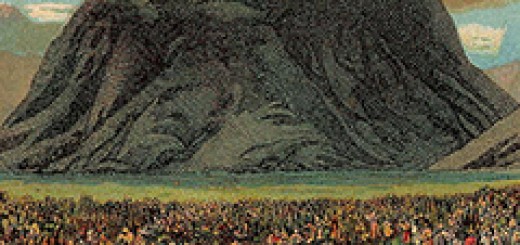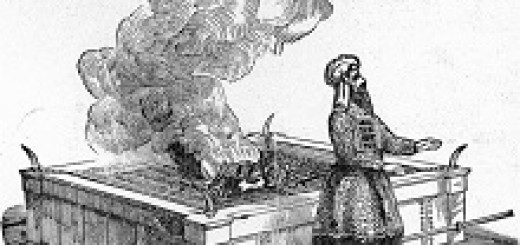By Avner Friedmann
The Parshah of this week tells us about the wrestling match between Yaakov and Esav’s Angel. The verse states,[1] “Yaakov was left alone and a man wrestled with him until the break of dawn. When he perceived that he could not overcome him, he struck the socket of his hip, so that Yaakov’s hip socket was displaced as he wrestled with him…” The Torah continues,[2] “Therefore the children of Israel must not eat the sinew of the hip socket to this day, because he struck Yaakov’s socket and displaced the sinew”.
The Zohar[3] explains that Halacha dictates that though one may not eat non- kosher food, on the other hand, he may derive benefit from it. Such is not the case regarding the sinew of the hip socket. Not only may we not eat it, but more so, we may derive no benefit from it whatsoever, not even by giving it to a dog to eat. Furthermore, non-kosher food is forbidden only in regard to food that “gives taste” (Notten Ta’am). The sinew however, has no taste. Nonetheless it still is forbidden.
Now, in Lashon HaKodesh (Biblical Hebrew) this sinew is called the, “Gid Hanasheh”. The word “Nasheh” is derived from the Hebrew root to forget.[4] The reason is because if Jews were to eat this sinew, it would cause forgetfulness of the service of HaShem. Instead, people would pursue the lusts and pleasures of their hearts.
The Gaon of Vilna[5] explains that the Gid Hanasheh is a euphemism for the reproductive organ. This is the place in the body that is most prone to falling to the evil inclination (the Yetzer hara) and is where Satan, the angel of Esav, has the strongest hold. Satan was the angel who wrestled with Yaakov. He found no place in Yaakovs’s body which he could overcome, because all of Yaakov’s limbs and sinews were pure due to his tremendous righteousness and observance of the mitzvot. The only place the angel could touch him was where he had at least a modicum of control. This was the area of the Brit Milah (The holy sign of the covenant). In that area Yaakov had some weakness because he had married two sisters. (This was part of Lavan’s evil plan to destroy the Jewish people at their root). Because of this the Torah instructs us not to consume the Gid Hanasheh; because this would strengthen our evil inclination, G-d forbid.
Now, the Zohar explains that the body of man consists of 248 limbs corresponding to 248 positive mitzvot. They also correspond to 248 supernal angels. Our bodies also consist of 365 sinews corresponding to the 365 negative mitzvot and also 365 other angels. They also correspond to the 365 days of the year; one angel for each day. The ninth day of the month of Av corresponds to the Angel of Esav and to the mitzvah prohibiting us from eating the Gid Hanasheh.
This is a day when Jews are particularly vulnerable to prosecution and judgment. Therefore, on the ninth of Av we need to be careful in our dealings and activities. On this very day it was decreed that the generation that left Egypt would not enter the land of Israel and would die in the desert. This is the day when, among other disasters throughout Jewish history, both the first and second Holy Temples were destroyed.
Because the ninth of Av corresponds to the angel of Esav, we fast on this day. This is because any food consumed on the ninth of Av gives strength to the side of evil (the Sitra Achara). The Zohar says that anyone who eats on the ninth of Av, it is as if he ate the Gid Hanasheh and that if Yaakov had not been weakened in this area by the angel, Esav’s power would have been broken in the heavens above and upon earth below many, many years ago.
The wrestling match between Yaakov and Satan all through the night represents the struggles of the Jewish people throughout the long and dark exile of Esav which we have been suffering for 2000 years. Just as Yaakov’s struggle with the angel was a physical as well as a spiritual, inner struggle, so likewise is our struggle during exile (galut). This includesboth our external struggle with the nations of the world who wish to destroy us, as well as our inner, spiritual struggle with our own personal evil inclination.
However, once the darkness of this galut will be over, with the coming of Moshiach, our struggles and difficulties will be over. Evil and wickedness will be eliminated forever and the ninth of Av will be transformed into a joyous holiday, with the building of the third Holy Temple, speedily in our days, Amen.
[1] 32:25-26
[2] 32:33.
[3] Vayishlach 170b.
[4] See the meaning Joseph gives the name of his son Menashe in Mikeitz 41:51.
[5] On Tikunei Zohar, Tikun 56.






















